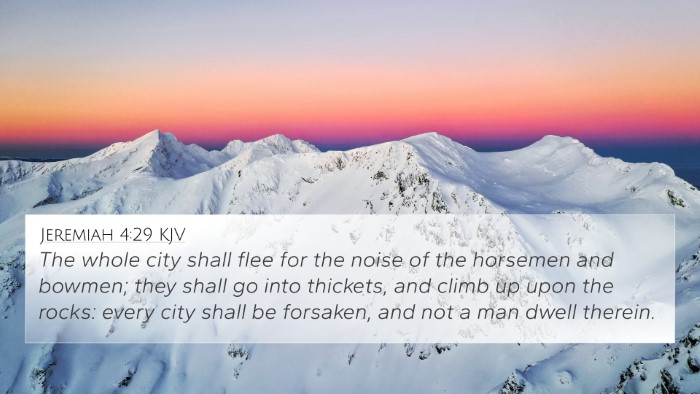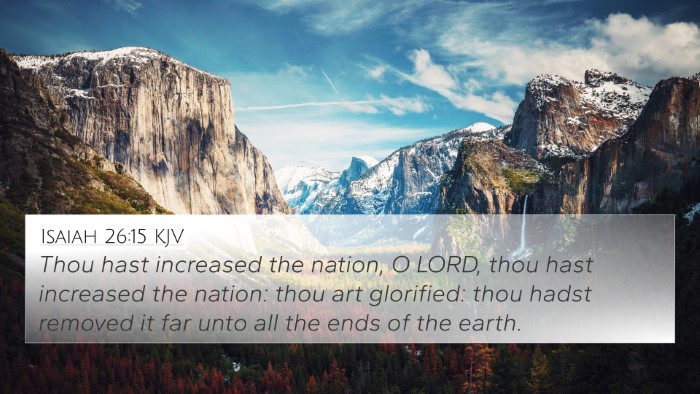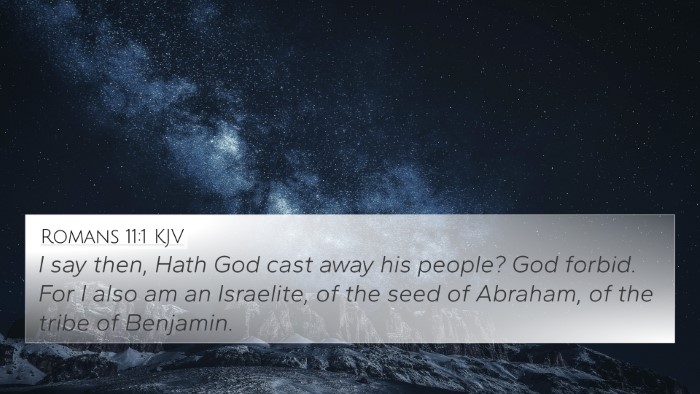Understanding Isaiah 6:12
Isaiah 6:12 states:
"And the LORD hath removed men far away, and there be a great forsaking in the midst of the land."
This verse comes from a significant passage in Isaiah, where the prophet receives his calling and vision of God's holiness. The message here reflects a deep sense of loss and abandonment felt by the people of Israel as they turn away from God. Drawing from the insights of various public domain commentaries, we can gain a comprehensive understanding of the verse's implications.
Insights from Commentaries
- Matthew Henry: Henry highlights the theme of judgment and desolation. He emphasizes that God’s withdrawal from the people leads to their spiritual and physical decline. The 'great forsaking' indicates a significant distancing from God's providential care due to Israel's disobedience.
- Albert Barnes: Barnes notes that this verse underscores the punishment that results from persistent sin. The 'removal' signifies a serious consequence for the nation, as God allows them to face the repercussions of their actions. He explains that this serves as a warning to all about the seriousness of distancing oneself from God.
- Adam Clarke: Clarke elaborates on the depth of abandonment described in Isaiah 6:12. He suggests that the phrase illustrates both a physical exile and a spiritual distancing from God. Clarke believes the message is a sobering reminder of the consequences that follow unfaithfulness to God's covenant.
Context and Thematic Connections
To fully understand Isaiah 6:12, it’s crucial to consider the context and related themes across Scripture. Here are some connections between Bible verses that further illuminate this message:
- Isaiah 5:13: "Therefore my people are gone into captivity, because they have no knowledge: and their honourable men are famished, and their multitude dried up with thirst." This verse reinforces the concept of the consequences of ignorance and rebellion against God.
- Jeremiah 52:3: "For through the anger of the LORD it came to pass in Jerusalem and Judah, till he had cast them out from his presence." This connects to the theme of being cast away due to disobedience, echoing the sentiments present in Isaiah 6:12.
- Lamentations 3:17: "And thou hast removed my soul far off from peace: I forgat prosperity." This verse captures the emotional and spiritual turmoil that results from separation from God, parallel to what Isaiah describes.
- Ezekiel 14:13: "Son of man, when the land sinneth against me by trespassing grievously, then will I stretch out mine hand upon it." This speaks to God's judgment on a sinful land, emphasizing the theme of divine consequence present in Isaiah's prophecy.
- Matthew 23:38: "Behold, your house is left unto you desolate." In the New Testament, Jesus echoes the sentiments of destruction and abandonment initially presented in Isaiah, showing the continuity of these themes.
- Romans 1:24: "Wherefore God also gave them up to uncleanness through the lusts of their own hearts." This verse illustrates God’s active role in withdrawing His protection as a result of humanity's choice to sin, linking to the ideas in Isaiah 6:12.
- Revelation 3:16: "So then because thou art lukewarm, and neither cold nor hot, I will spue thee out of my mouth." This verse warns of the consequences of spiritual lukewarmness similar to the forsaking noted in Isaiah 6:12.
Cross-Referencing Biblical Texts
For deeper study, cross-referencing Biblical texts can provide significant insights regarding Isaiah 6:12. Here are some methods and tools that help with this task:
- Bible Concordance: A Bible concordance can help locate various themes and related verses throughout Scriptures.
- Bible Cross-Reference Guide: Utilizing cross-reference guides aids in identifying connections and parallels among verses.
- Cross-reference Bible Study Methods: Engaging in thematic studies can illuminate how verses connect across both the Old and New Testaments.
Conclusion
Isaiah 6:12 serves as a profound reminder of the consequences of abandoning God. The insights from various commentaries and the rich intertextual connections within Scripture showcase a consistent message about the importance of fidelity to God's word. By using tools and methods of cross-referencing, readers can deepen their understanding of significant Biblical themes and gain a fuller perspective of the scriptures that relate to one another.
Further Considerations
As you reflect on Isaiah 6:12, consider how it applies to personal faith and the broader community. Identifying the links between themes in Isaiah and other prophetic writings can enhance your spiritual journey and understanding of scripture.













